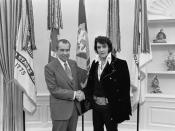After inheriting the Vietnam War from the Johnson administration in 1969, Richard Nixon set out on a mission to end it. In a speech, Nixon declared, "I'm not going to end up like LBJ, holed up in the White House afraid to show my face on the street. I'm going to stop that war. Fast." Unfortunately, Nixon did not fulfill his final part of the bargain by bringing the war to a quick close. The Nixon administration did not reach a peace settlement with the North Vietnamese until January 1973, almost four years after taking office. However, there were signs that this agreement, or at least one with similar terms, could have been met four years earlier. What then caused Nixon to drag his feet in ending this war? Part of Nixon's foreign policy strategy was to present a "madman" image of himself to the North Vietnamese, not to mention China and the Soviet Union.
Based on Eisenhower's tactics in bringing the Korean War to a close, Nixon threatened the destruction of the North Vietnamese forces through passive and active escalations of the war. Nixon wanted his communist enemy to fear his unpredictability and willingness to do anything to stop the conflict, even if it meant the use of nuclear weapons . Due to the divisions within the government and the power of negative public opinion, Nixon's strategy had to remain a secret aspect of his publicly proclaimed policy of Vietnamization - the gradual removal of American troops and handing over of the war to the South Vietnamese forces. With the aid of his National Security Advisor Henry Kissinger, the "secret strategy" became an operation that did not achieve the decisive result it was looking for until January 1973, a "peace with honor." In other words, it did not bring...


